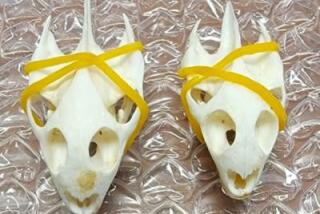U.S. Imposes Wildlife Ban on Singapore
- Share via
In an unusual action begun quietly last week, the U.S. Fish and Wildlife Service has banned all wildlife imports from Singapore--worth an estimated $17 million each year--because of that country’s refusal to abide by international protections for rare animals.
The action by the Fish and Wildlife Service has virtually shut down Singapore’s lucrative $12-million home-grown tropical fish trade with the United States, most of it processed through Los Angeles International Airport.
And more important to environmentalists, the ban has ended Singapore’s alleged $3-million to $5-million traffic to the United States in illicitly obtained animal products.
They include rare birds--like the black palmcock, illegally obtained and selling for $10,000 here--reptiles, rhino horns and elephant ivory, and the hide of a rare mammal, the pangolin, which is usually shipped to Texas, where it is made into cowboy boots, officials said, or to the Far East, where its hairy scales are used by herbalists.
The problem arose, officials said, because the United States, as a signatory to the Convention on International Trade in Endangered Species (CITES), requires that every animal and animal product imported also carry a certificate of origin, to prove that the animal did not come from a country where it is protected as an endangered or threatened species.
“We’ve been dealing with Singapore through the Department of State for more than a year, to get documentation,” said Kathleen King, an enforcement specialist with the service. “They have not been cooperative,” and “finally we refused clearance to all shipments.”
King said Singapore usually “doesn’t declare the country of origin,” and in fact re-exports protected animals and products taken illegally from their native lands. In effect this is “laundering” the product, said World Wildlife Fund expert Ginette Hemley.
“Laundering, as we define it, is obscuring the true origin of wildlife, or falsifying the origin” to conceal illegal goods, “and Singapore is a laundering center,” Hemley said.
It is impossible, said Hemley, that Singapore, an urbanized island nation about the size of Chicago, could have the sizable population of reptiles, rare birds, elephants, rhinos and other animals that its export volume would indicate.
What prompted the Fish and Wildlife Service to act, King said, was importation of the rare pangolin, a mammal that resembles an anteater. It is known to live wild only in Thailand, Indonesia and Malaysia, where it is protected. Yet pangolin hides are exported from Singapore each year, and “clearly these (animals) didn’t live in Singapore,” said King.
A Singapore embassy official in Washington said Thursday she could not comment on the re-exporting of rare species, but said: “The thing that is concerning us now is the tropical fish. It amounts to $12 million coming in (each year) and the action of the Fish and Wildlife Service has effectively put an embargo on our imports of tropical fish.
“It is not a big industry but there are many . . . little breeders,” said Leela Kumaran, first secretary for economics. “We have calls from importers (in Southern California) asking where the fish are.” She said that Singapore has pledged to sign the CITES convention.
King said a similar blanket ban was placed on the Philippines last year, when the government refused to detail where its animal products originated. The ban, which excluded the profitable reptile shoe trade from the United States, lasted three days before the government agreed to meet U.S. documentation standards, King said.
Marie Palladini, senior Fish and Wildlife agent in Southern California, said no shipments from Singapore have yet been seized in Los Angeles. “Apparently the word (about the ban) got out, and no wildlife has been exported.”
More to Read
Sign up for Essential California
The most important California stories and recommendations in your inbox every morning.
You may occasionally receive promotional content from the Los Angeles Times.














